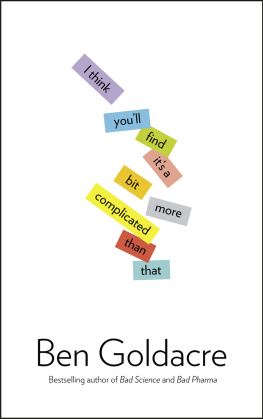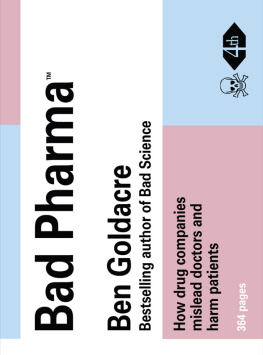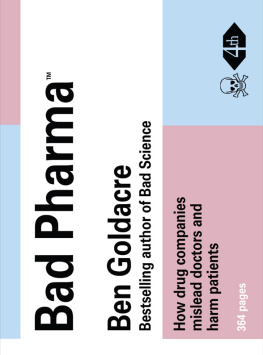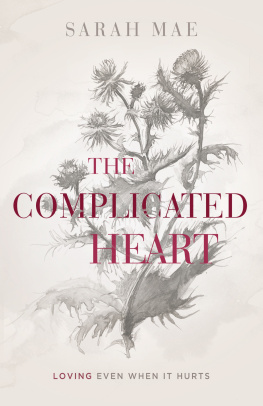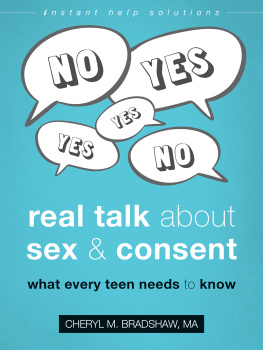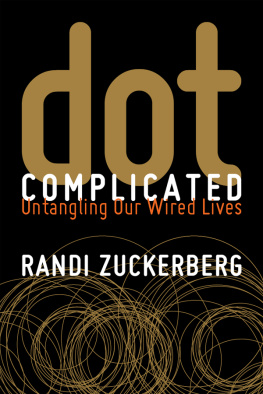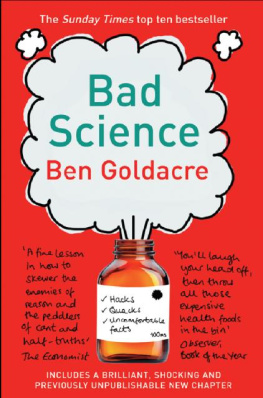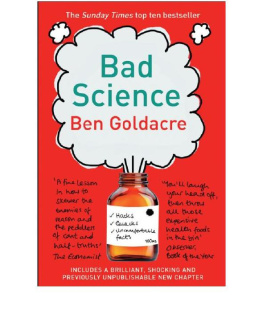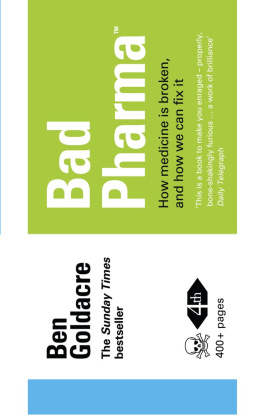Ben Goldacre - I Think Youll Find Its a Bit More Complicated Than That
Here you can read online Ben Goldacre - I Think Youll Find Its a Bit More Complicated Than That full text of the book (entire story) in english for free. Download pdf and epub, get meaning, cover and reviews about this ebook. year: 2014, publisher: Fourth Estate, genre: Politics. Description of the work, (preface) as well as reviews are available. Best literature library LitArk.com created for fans of good reading and offers a wide selection of genres:
Romance novel
Science fiction
Adventure
Detective
Science
History
Home and family
Prose
Art
Politics
Computer
Non-fiction
Religion
Business
Children
Humor
Choose a favorite category and find really read worthwhile books. Enjoy immersion in the world of imagination, feel the emotions of the characters or learn something new for yourself, make an fascinating discovery.
- Book:I Think Youll Find Its a Bit More Complicated Than That
- Author:
- Publisher:Fourth Estate
- Genre:
- Year:2014
- Rating:5 / 5
- Favourites:Add to favourites
- Your mark:
- 100
- 1
- 2
- 3
- 4
- 5
I Think Youll Find Its a Bit More Complicated Than That: summary, description and annotation
We offer to read an annotation, description, summary or preface (depends on what the author of the book "I Think Youll Find Its a Bit More Complicated Than That" wrote himself). If you haven't found the necessary information about the book — write in the comments, we will try to find it.
I Think Youll Find Its a Bit More Complicated Than That — read online for free the complete book (whole text) full work
Below is the text of the book, divided by pages. System saving the place of the last page read, allows you to conveniently read the book "I Think Youll Find Its a Bit More Complicated Than That" online for free, without having to search again every time where you left off. Put a bookmark, and you can go to the page where you finished reading at any time.
Font size:
Interval:
Bookmark:
Contents


Fourth Estate
An imprint of HarperCollinsPublishers
7785 Fulham Palace Road,
Hammersmith, London W6 8JB
www.4thestate.co.uk
First published in Great Britain by Fourth Estate in 2014
Copyright Ben Goldacre 2014
Ben Goldacre asserts the moral right to be identified as the author of this work
Dr Goldacre Doesnt Make Everything Better by Jeremy Laurance the Independent/www.independent.co.uk
A catalogue record for this book is available from the British Library
All rights reserved under International and Pan-American Copyright Conventions. By payment of the required fees, you have been granted the non-exclusive, non-transferable right to access and read the text of this e-book on-screen. No part of this text may be reproduced, transmitted, down-loaded, decompiled, reverse engineered, or stored in or introduced into any information storage and retrieval system, in any form or by any means, whether electronic or mechanical, now known or hereinafter invented, without the express written permission of HarperCollins
Source ISBN: 9780007462483
Ebook Edition October 2014 ISBN: 9780007505159
Version: 2014-09-18
To whom it may concern.
And Archie.
And Alice.
This is a collection of my most fun fights, but the fighting is just an excuse. There is nothing complicated about science, and people can understand anything, if theyre sufficiently motivated. Coincidentally, people like fights. Thats why Ive spent the last ten years lashing science to mockery: its the cleanest way I know to help people see the joy of statistics, and the fascinating ways that evidence can be distorted or ignored.
But these arent personal attacks, and Im not an angry person. All too often, people hoping to make science accessible fall into the trap of triumphalism, presenting science as a canon, and a collection of true facts. In reality, science is about the squabble. Every fight you will read in this book, over the meaning of some data, is the story of the scientific process itself: you present your idea, you present your evidence, and we all take turns to try and pull them both apart. This process of close critical appraisal isnt something we tolerate reluctantly, in science, with a grudge: far from it. Criticism and close examination of evidence is actively welcomed it is the absolute core of the process because ideas only exist to be pulled apart, and this is how we spiral in on the truth.
Away from the newspapers and science TV shows you can see that process, very clearly, in the institutions of science. The question-and-answer session at any academic conference, after someone presents their scientific research, is often a bloodbath: but nobodys resentful, everyone expects it, and we all consent to it, as a kind of intellectual S&M activity. We know its good for our souls. If the idea survives, then great; if it needs more evidence, we decide what studies are needed next and do them. Then we all come back next year, tear the evidence apart again, and have another think. Real scientists know this. Only the fakers cry foul.
In short, this book has a manifesto: check the evidence and fight back against anyone who tries to stop you. Along the way, you will get a grounding in statistics, study design, evidence-based policy and much more, in bite-size chunks. Because while my last two books Bad Science and Bad Pharma were polemics with a shape, this is a racing collection of short pieces. As such, I hope it works as a kind of statistics toilet book, bringing satisfaction in short bursts, with a fight and an idea in each one.
So in the section of this book on surveys, we laugh at the stupidity of the nuclear power industry, some silly anti-abortionists and StoneWall (whom I actually adore). Or, if you prefer: we learn about the distortions of participant bias, misleading question design and a sticky problem involving a complex time-dependent variable. In the first piece of the book we cover some surprisingly unprofessional behaviour from a Baroness, Professor and previous Director of the Royal Institution. Or, if you prefer: we cover post-publication peer review and why the conventions of academic journals are helpful.
These pieces cover two decades of work. There are lots of Guardian columns, but also academic papers, a report for the UK education minister, my work in the Romney, Hythe and Dimchurch Railway Guidebook, the odd undergraduate essay and more. If Im honest, its pretty soulful (for me, not you) looking back over two decades and seeing what has changed. I was in my twenties and barely out of medical school when I started writing a column in the Guardian. As time passed, the targets got bigger, my day job took me through postgraduate qualifications and grown-up battles, and I think I got better at pulling claims apart. There was also discipline from outside: writing about other peoples misdeeds, collecting ever greater numbers of increasingly powerful enemies and all under British libel law is like doing pop science with a gun to your head. So for that, thanks.
At the end I might tell you a little about how I work, why I do what I do, who made me, and how things have changed over the past two decades. For now, lets just say Im very grateful to all the many companies and people who, by their optimistically bad behaviour under fire, have given narrative colour to what might otherwise have been some very dry explanations of basic statistical principles.
Whats in this book
Ive written 500,000 words in the last decade, so there is no repetition, and the corpses of folk like Gillian McKeith, the homeopaths and Big Pharma are left in my previous two books (although these characters fight on, like zombies, in the real world). My academic work on statins and Big Data is saved for a fun project that will be launching shortly. Lastly, most of my writing on randomised trials in education, policing and everywhere else is held back, as my book on this topic will come out in due course.
There is, however, some structure to this school reunion. In How SCIENCE WORKS we cover peer review, how research is unpicked and critiqued after publication, how we deal with contradictory research, the importance of methods and results being freely available, whether it matters who a researcher is, how cherry-picking harms science, and how myths are made when inconvenient results are ignored.
In BIOLOGISING we cover crass reductionism, including the peculiar beliefs that pain is only real when we scan see it on a brain scanner, that misery is best thought of as molecular, and that girls like pink because they evolved to look for berries. In STATISTICS we start with easy maths and accelerate painlessly to some fairly advanced notions. We cover why the odds of three siblings sharing a birthday is not 48,627,125 to 1, why spying on us all to spot the occasional terrorist is highly unlikely to work, how statistical tools for fraud helped catch Greece faking its national economic data, what you can tell from a change in abortion rates for Downs syndrome, the many ways you can slice data to get the answer you want, the hazards of looking for spatial patterns on maps, and the most core statistical skill of all: how we can detect a true signal from everyday variation in background noise.
Then we go on to the glory of BIG DATA, the battles with government to get hold of it, the risks of sharing medical records with all and sundry, and the magical way that patterns emerge from the formless static of everyday life when you have huge numbers. In SURVEYS we learn the tricks of a sticky trade, and then we shift up a gear to cover EPIDEMIOLOGY, my day job, the science of spotting patterns in disease. Here we see how clever things called funnel plots can help to show whether one areas healthcare really is any worse than anothers, whether an increase in antidepressant prescriptions really does mean more people are depressed (or even whether more people are taking antidepressants), and the core skill of all epidemiology: how to correct for confounding variables, or rather: how to make sure that apparent correlations in your data are real. In an overview of bicycle helmet research, we review every epidemiological error in the textbooks, and a grand claim about the benefits of screening for diseases helps show that doing something even something small can often be worse than doing nothing at all. We see why different study designs are needed to research common and rare diseases, and how frail memories can distort the findings, why we should never assume that laboratory tests are correlated with real patients suffering, and how simple blinded experiments can spot if a 70 wine magnetiser really does change the flavour.
Next pageFont size:
Interval:
Bookmark:
Similar books «I Think Youll Find Its a Bit More Complicated Than That»
Look at similar books to I Think Youll Find Its a Bit More Complicated Than That. We have selected literature similar in name and meaning in the hope of providing readers with more options to find new, interesting, not yet read works.
Discussion, reviews of the book I Think Youll Find Its a Bit More Complicated Than That and just readers' own opinions. Leave your comments, write what you think about the work, its meaning or the main characters. Specify what exactly you liked and what you didn't like, and why you think so.

